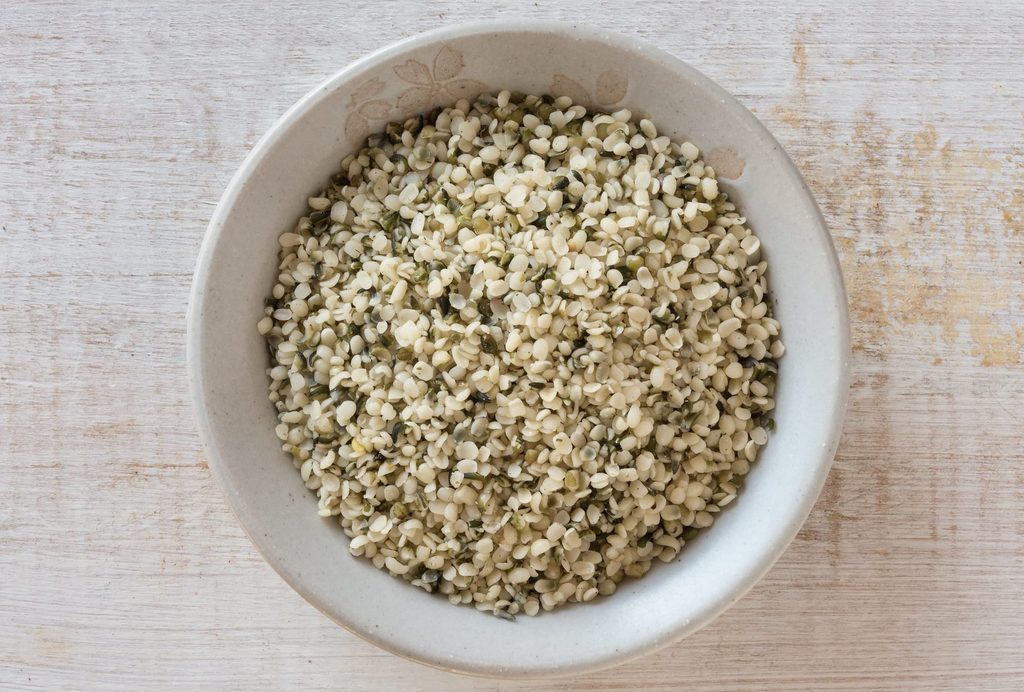Want to Add Hemp Seeds to Your Diet? Here’s What You Need to Know

These small, brown seeds are big on nutrition. Here's what you need to know about the health benefits and risks of adding them to your diet.
Our editors and experts handpick every product we feature. We may earn a commission from your purchases.
If hemp seeds aren’t a part of your current diet, you may want to change that. Packed with fibre, omega-3, omega-6, protein, and magnesium; these small seeds can have a big impact on heart health and skin health, and may even help with weight loss.
Here’s why you may want to add them to your diet—either raw, sprinkled onto salads, into yogurt or oats, or topping baked goods.
(Related: The Great Canadian Hemp Cookie)
What are hemp seeds and where do they come from?
Hemp seeds are the seeds of the hemp plant called Cannabis sativa. They have a hard outer shell and a soft inside. Yes, they are from the same species as marijuana, but hemp seeds contain only trace amounts of THC (tetrahydrocannabinol)—the main psychoactive ingredient in cannabis. They don’t have any psychoactive properties, explains New York-based registered dietitian Alissa Rumsey, author of Unapologetic Eating: Make Peace with Food and Transform Your Life, and founder of Alissa Rumsey Nutrition and Wellness. “They have a subtle, nutty flavor and their small size allows them to be easily added to recipes to boost the protein and fat content,” says Rumsey.
Nutrition facts
Hemp seeds are a good source of protein, healthy fats, and fibre. “They are a good source of plant-based protein, with 10 grams of protein in three tablespoons of seeds, essential fatty acids including omega-3 fats, and fibre, with about one gram per three tablespoons,” says Rumsey.
According to the U.S. Department of Agriculture, three tablespoons or 30 grams of hemp seeds contain the following nutrients:
- Fat: 15 g
- Sodium: 1.5 mg
- Carbohydrates: 2.6 g
- Fibre: 1.2 g
- Sugar: .5 g
- Protein: 9.5 g
- Calcium: 21 mg
- Iron: 2.38 mg
- Potassium: 360 mg
- Magnesium: 210 mg
- Manganese: 2.28 mg
- Zinc: 2.97 mg
Health benefits of hemp seeds
While hemp seeds are packed with healthy omega-3 fatty acids, they also have omega-6 fatty acids (known as linoleic acid), as well as gamma-linolenic acid (GLA). In fact, their nutrient makeup is over 30 percent fat—but it’s healthy fat. And GLA offers several benefits, such as boosting brain and bone health and keeping your metabolism humming. It has also been found to reduce inflammation, according to a study published in Inflammation.
The omega-6 and omega-3 fatty acids can also benefit your skin, relieving dryness and itchiness, suggests a study in the Journal of Dermatological Treatment.
Some research even suggests that hemp seeds help reduce the risk of heart disease thanks to their content of the amino acid arginine. Arginine produces nitric oxide which, according to a study in Current Atherosclerosis Reports, can help lower blood pressure.
“They’re also good for digestive health because they have both soluble and insoluble fibre,” says Sara Haas, RDN and food and nutrition expert with formal training in the culinary arts, based in Chicago.
Hemp seeds and weight loss
Cutting back on meat can help shed pounds, but you still need to get protein. That’s where hemp seeds can help: They’re an excellent source of plant-based protein. “The interest in plant-based protein alternatives has been increasing in recent years as people look to add more plants to their daily diets,” says Rumsey. The combination of fibre, fat, and protein can also have weight loss benefits, explains Haas, as they can help make you feel full longer and curb hunger. The fat-plus-protein combo can help you fill up faster and stay full longer—and that can lead to weight loss.
Hemp seeds risks and side effects
It’s worth noting the rare but possible side effects of eating hemp seeds. Because of their high-fat content, when eaten in excess, hemp seeds may cause loose stools or diarrhea. Also, if you have an allergy to hemp seeds, you should obviously avoid consuming them.
Where to buy hemp seeds
Hemp seeds are available at grocery stores and health good stores, and can also be purchased online through trusted retailers. Try Manitoba Harvest Hemp Hearts Shelled Hemp Seeds, $7, available at houseofwellness.ca.
Best ways to eat hemp seeds
There are lots of ways to add this superseed into your weekly menu. “You can put it on just about anything,” says Haas. “I like it on top of yogurt, dusted over my morning toast, as an ingredient for veggie burgers or whirled in a smoothie.” Hemp seeds can also be enjoyed in oatmeal, on top of salads, blended into soups or stews, added to dips, dressings, or hummus, or used in baked goods, like muffins.
(Related: Radish, Kale & Hemp-seed Salad with Lemon-Honey Dressing)
Here are two recipes from Rumsey that are a great way to incorporate hemp seeds into your diet.
Smoothie Recipe
Serves 1
Ingredients:
- 1/2 cup Greek yogurt
- 1 cup of fresh fruit
- 1/2 cup of milk of your choice
- 3 tablespoons of hemp seeds
Instructions:
Add all ingredients to blender. Blend until smooth. Enjoy!
Overnight Oats Recipe
Serves 1
Ingredients:
- 1/2 cup of old-fashioned rolled oats (raw)
- 2 tablespoons of hemp seeds
- 1 cup of milk of your choice
- 1/4 teaspoon of vanilla extract
- dash of cinnamon
- 1-2 tablespoons of nuts or nut butter (optional)
Instructions:
Mix ingredients together. Refrigerate overnight or at least up to 4 hours. Top with fresh fruit and more hemp seeds if desired.
Next: Should You Be Eating Chia Seeds? Here’s What Nutritionists Say




